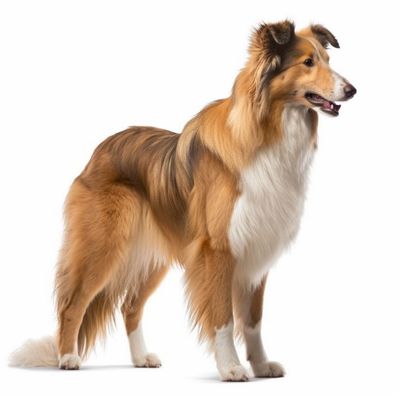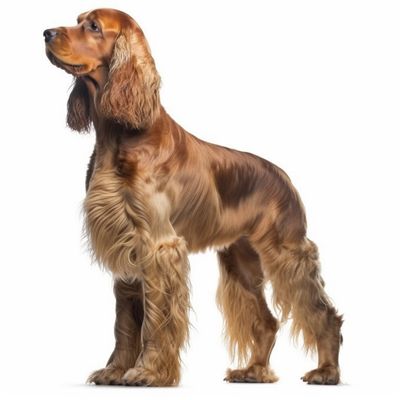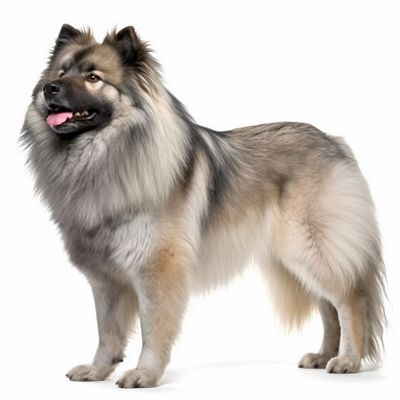Collie - vs - Cocker Spaniel - vs - Keeshond

Collies are elegant and well-proportioned, standing 22-26 inches tall and weighing 50-75 lbs.
Collies have moderate energy levels and enjoy daily walks and playtime, but they're not overly demanding.
Collies require regular exercise, such as walks and playtime, to keep them mentally and physically fit.
Intelligent and eager to please, Collies are easy to train and excel in obedience, agility, and herding activities.
Collies are highly intelligent dogs, known for their problem-solving skills and quick learning abilities.
Collies can adapt to various living situations, but they prefer having access to outdoor space for exercise and play.
Collies are gentle, patient, and loving, making them wonderful companions for children.
Collies usually get along well with other dogs and pets, especially if socialized from an early age.
Collies have a thick double coat that helps them tolerate cold weather, but they still need proper shelter and protection.
Collies can manage in hot climates, but they require shade, water, and limited exercise during the hottest parts of the day.
Collies shed seasonally, with heavier shedding during coat changes. Regular brushing can help minimize shedding.
Collies need regular brushing to keep their coats clean and prevent matting.
Collies have average bark tendencies and may bark for various reasons, such as alerting their owners or during playtime.
Collies are generally healthy, but regular veterinary checkups and preventative care are still necessary.

Cocker Spaniels are medium-sized dogs, weighing 20-30 lbs, with a height of 14-16 inches.
Cocker Spaniels enjoy daily walks, playtime, and moderate exercise to maintain their physical and mental health.
Cocker Spaniels are intelligent and eager to please, making them relatively easy to train with patience and consistency.
Cocker Spaniels are intelligent dogs known for their problem-solving skills and quick learning ability.
Cocker Spaniels are adaptable and can thrive in various living situations, including apartments and houses.
Cocker Spaniels can be good with kids, especially when socialized from a young age.
Cocker Spaniels can get along well with other pets when properly socialized.
Cocker Spaniels can tolerate cold weather but should be protected from extreme cold with appropriate clothing and shelter.
Cocker Spaniels can handle some heat but should be provided with shade, water, and limited time outdoors in high temperatures.
Cocker Spaniels have medium shedding due to their long, silky coats.
Cocker Spaniels require regular grooming, including brushing, to keep their coats healthy and free of mats.
Cocker Spaniels have average bark tendencies and may bark for various reasons, such as alerting their owners or during playtime.
Cocker Spaniels may have some health issues, requiring regular veterinary checkups and preventative care.

Keeshonds are medium-sized dogs, weighing 35-45 lbs, with a height of 17-18 inches.
Keeshonds have a medium energy level and enjoy a balance of activity and relaxation.
Keeshonds need regular exercise, including daily walks and play sessions, to stay happy and healthy.
Keeshonds are intelligent and highly trainable, responding well to positive reinforcement and consistency.
Keeshonds are highly intelligent dogs and can excel in various dog sports and activities, such as agility and obedience.
Keeshonds can adapt to various living situations, including apartments and larger homes, as long as their exercise needs are met.
Keeshonds are good with children, as they are generally friendly, playful, and patient.
Keeshonds can get along well with other pets, especially when raised together.
Keeshonds can tolerate cold climates well due to their thick, double-layered coats.
Keeshonds can tolerate hot climates but need to be monitored for signs of overheating during exercise.
Keeshonds have a thick double coat and shed heavily, especially during seasonal changes. Regular grooming is necessary.
Keeshonds require frequent grooming, including brushing and occasional trimming, to keep their coats clean and healthy.
Keeshonds tend to bark more frequently and may require consistent training to manage their barking.
Keeshonden are generally healthy, but regular veterinary checkups and preventative care are still necessary.



